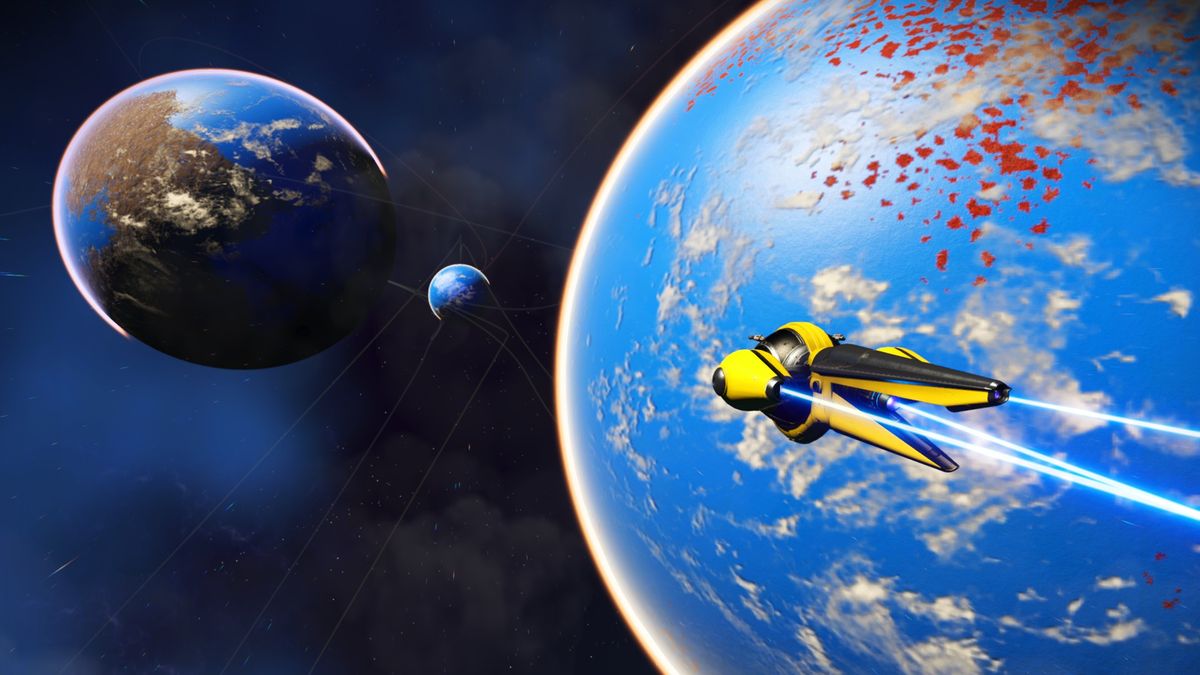No Man's Sky's Sean Murray says devs should be quiet after a rough launch
Speaking from experience.

During his keynote at dev conference Develop: Brighton, Hello Games' Sean Murray offered some advice for developers facing the type of troubled launch that No Man's Sky experienced when expectations and reality collided. It's simple advice but undoubtedly harder than it sounds: stop talking.
"We went about two years without talking to press at all", Murray said. "And we went about three months without saying anything to the community, either. That was really hard. I sat down so many times and wrote the perfect blog post that was going to explain everything about the game's development, and the road map going ahead. But I could see that it didn't hold credibility with regards to where we were at."
No Man's Sky was huge and beautiful, but confusing and aimless and burdened with expectations that Hello Games did a bad job of tempering. In the face of review scores that were all over the place and a lot of negative player feedback, the studio remained staunchly silent, for the most part, until it had something concrete to offer. Since then, No Man's Sky has evolved into a much richer, welcoming game that still retains an air of mystery.
Over the last year there have been several high-profile launches that went poorly, and in those cases the studios have been a lot more communicative. With Fallout 76, Anthem and Sea of Thieves, the respective teams were on Twitter and giving interviews acknowledging the issues and promising changes, followed by roadmaps and piecemeal updates.
"I can see EA, Microsoft,or Bethesda try to placate players by just talking to them, but for right or wrong, it just doesn't really work. You see this all the time when a big publisher will talk to the community and try to solve the problem and then get embroiled, taking up more and more of its head space."
Quietly working away ended up being the right way for Hello Games to do things, but it's definitely not a one-size-fits-all solution. Anthem's taken a beating this year, but whenever BioWare shares its plans or discusses the issues, there's a wave of goodwill from players who want to know where the game is going. And there's one significant difference between No Man's Sky and Fallout 76, Sea of Thieves and Anthem: it's not really a multiplayer game. At launch, it didn't even have co-op.
MMOs and games as a service have in-game events and generally a greater cadence of updates and hotfixes than singleplayer games. An MMO developer going radio silent just invites confusion and frustration. Just look at what's been happening in EVE Online, where an ostensibly interesting event has become a grind that's interfering with players' own stories and wars. The longer CCP remained silent, the more the mood turned sour.
The biggest gaming news, reviews and hardware deals
Keep up to date with the most important stories and the best deals, as picked by the PC Gamer team.
In the case of Sea of Thieves, Rare has managed to turn the game around and keep players informed. Even last year, it was starting to show its potential. A year later and it's still popular, the community is largely happy and it's heading in a similar direction as No Man's Sky. Even Fallout 76, the butt of jokes for a while, is starting to look promising, and having a roadmap that lets players know NPCs are coming or when they were able to start setting up their own stores kept people interested, even after the initial disappointment.
Valve, not normally very chatty anyway, isn't going to be doing any talking about Aritfact in the near future, instead focusing on figuring out where it went wrong. It had lost most of the players that picked it up at launch by the time this happened, though. With autobattlers being the new trend, it feels like people have really just forgotten about it though. If it comes back, I'm not sure anyone is really going to care.
Murray's approach seems to still be working for No Man's Sky, however. Hello Games isn't radio silent now, but generally it doesn't share too much until there's something fairly tangible to show off. That middle ground it's found sounds more realistic for other developers, where players are informed but their expectations are managed.
Cheers, GamesRadar.

Fraser is the UK online editor and has actually met The Internet in person. With over a decade of experience, he's been around the block a few times, serving as a freelancer, news editor and prolific reviewer. Strategy games have been a 30-year-long obsession, from tiny RTSs to sprawling political sims, and he never turns down the chance to rave about Total War or Crusader Kings. He's also been known to set up shop in the latest MMO and likes to wind down with an endlessly deep, systemic RPG. These days, when he's not editing, he can usually be found writing features that are 1,000 words too long or talking about his dog.
Most Popular








